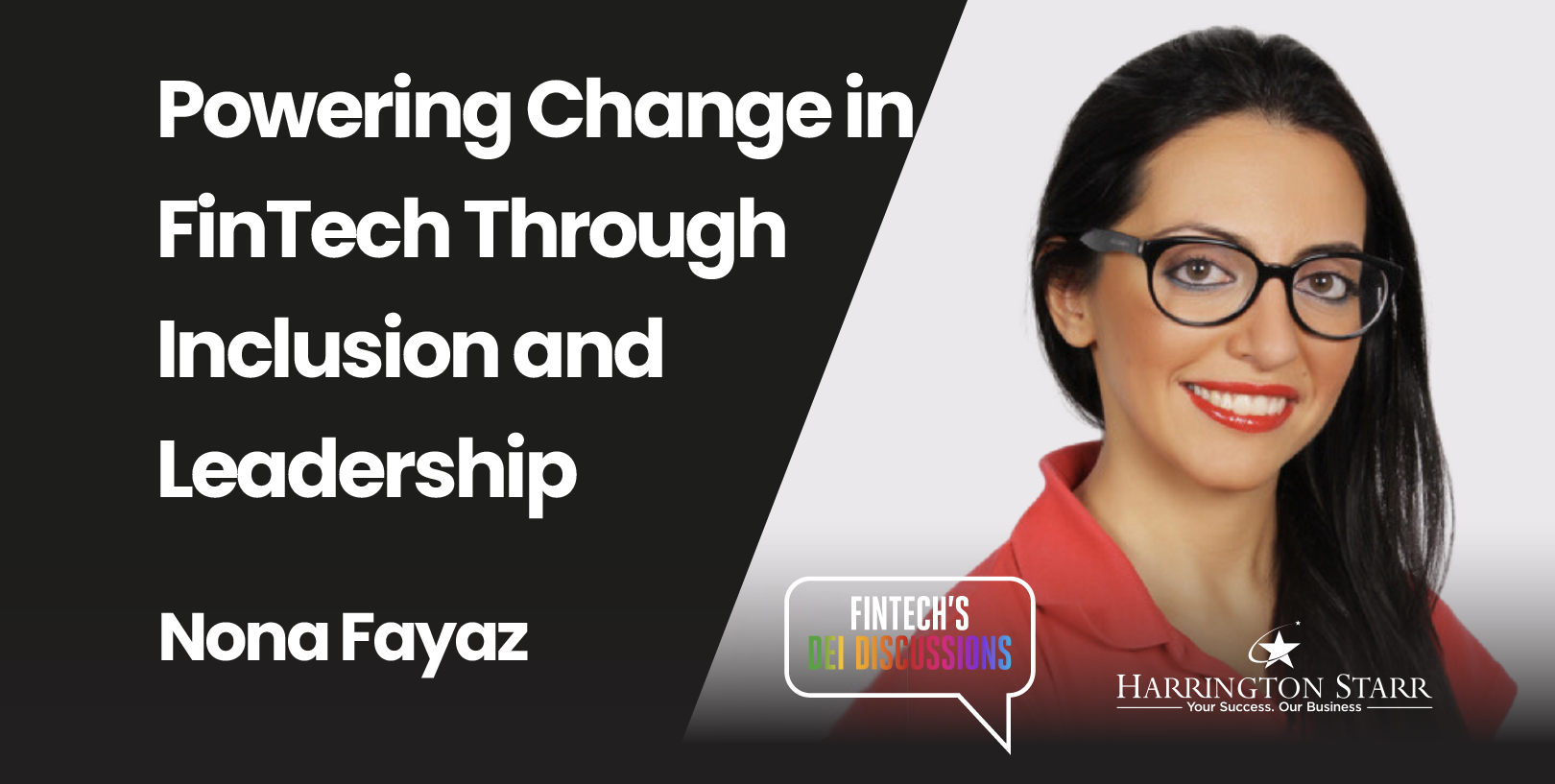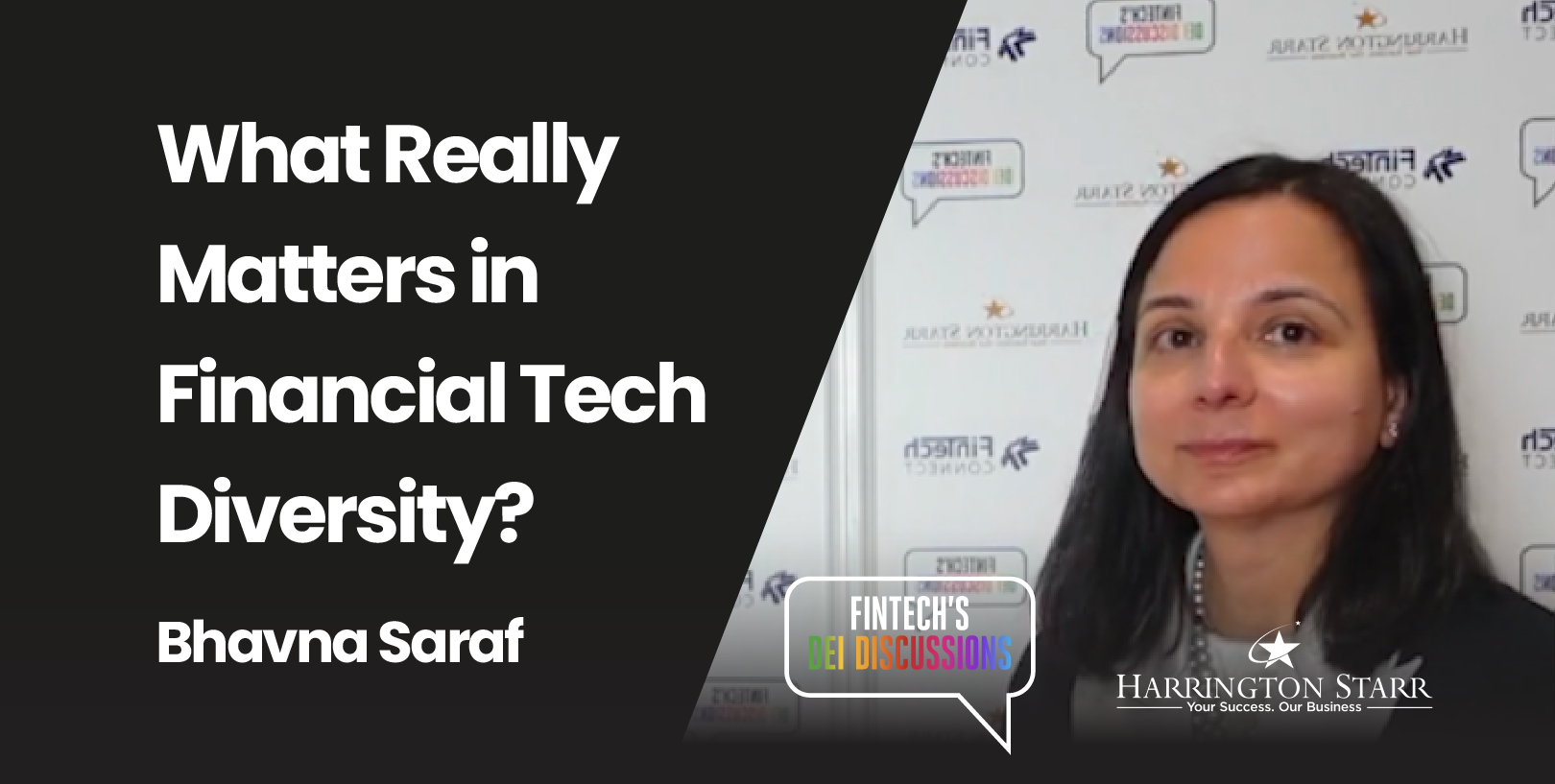
In this episode of FinTech’s DEI Discussions, Nadia welcomes Nona Fayaz, Head of Partnerships at Fuse Finance, to share her story and insights about diversity, equity, and inclusion (DEI) in the FinTech and financial services industry. The conversation revolves around Nona’s journey, the challenges she’s faced, her experiences as a woman in FinTech, and the steps organisations can take to promote inclusivity, especially within the rapidly evolving fintech sector.
The episode begins with Nona providing an overview of her career trajectory. She started her professional life at the age of 19 as an office manager at a payments company. At the time, she was largely tasked with administrative responsibilities such as answering phones and writing down minutes during meetings. However, Nona’s curiosity about the payments and FinTech industry led her to actively learn more about the industry beyond her role. Over time, she transitioned into more technical positions, including software design and programming. Eventually, Nona took on a leadership role in business development, overseeing the MENA (Middle East and North Africa) region and later pivoting to FinTech as online payments began to transform the financial services landscape.
Nona’s rise within FinTech is a clear reflection of her adaptability and willingness to embrace new opportunities. Today, she leads the partnership department at Fuse Finance, a FinTech company with a significant presence in Dubai and Europe. Throughout her career, Nona has learned the importance of taking control of one’s own path, emphasising that women in the industry must be proactive about their careers rather than waiting for opportunities to be handed to them.
Throughout this discussion, there is a common thread: while individual empowerment and resilience are key, organisations play an equally significant role in fostering inclusive cultures that enable all employees to thrive. This episode is particularly relevant given the ongoing efforts of companies like Harrington Starr to lead the charge in DEI, not just in principle but through action.
The Role of Female Empowerment and Inclusion in FinTech
A key theme of the discussion is the role of female empowerment and inclusion in the FinTech sector. Nona points out that while progress has been made in terms of gender diversity, challenges remain, particularly in companies where cultural biases still exist. She advocates for women to take ownership of their abilities and to be confident in demonstrating their value. For Nona, empowerment comes from within, and it is crucial for women to assert themselves in the workplace. However, she stresses that women should support and uplift each other, rather than seeing one another as competitors. Nona believes that when women work together and encourage one another, they can make a greater impact in their organisations.
Nona also touches on the broader importance of diversity and inclusion in FinTech. She acknowledges that many companies are making strides in promoting DEI, but there are still areas for improvement. Cultural barriers, particularly in regions like the Middle East, can present additional challenges for women and minority employees. Nevertheless, Nona is optimistic that with continued effort and support from leadership, progress can be made toward creating more inclusive workplaces.
Nona’s Personal Journey with Cancer: A Story of Resilience
One of the most personal and powerful stories Nona shares in this episode is her battle with breast cancer. Nona recalls how, upon receiving her diagnosis, she made the decision to continue working rather than taking extended time off. She approached her manager and explained her situation, asking for support so that she could maintain her professional responsibilities while undergoing treatment. Nona’s decision to remain in the workplace during this time is a testament to her resilience and determination.
She describes how, despite the challenges of her health, she was able to continue signing deals and contributing to her company’s success. Nona credits the support of her manager and colleagues for helping her navigate this difficult period. Her story underscores the importance of workplace support systems, particularly for employees facing personal hardships. Nona’s experience also highlights the need for open communication between employees and management, as well as the role that inclusive leadership plays in fostering a supportive work environment.
Nona's career is a testament to the importance of adaptability and self-driven growth. She emphasises that in any sector—particularly FinTech—employees should take charge of their careers and not wait for others to pave the way for them. Her journey highlights the importance of continuous learning and the value of diverse experiences in shaping a successful career.
What FinTech Companies Can Do to Promote Inclusion
Drawing from her own experiences, Nona offers practical advice for FinTech companies looking to improve their DEI efforts. One of the most important steps companies can take, according to Nona, is to foster open communication within the organisation. Employees should feel comfortable sharing their experiences and perspectives without fear of judgment or retaliation. By encouraging dialogue about diversity and inclusion, companies can create Financial Technology environments where all voices are heard.
Nona also emphasises the importance of fair and equal policies, particularly regarding gender pay equality. She points out that in many sectors, women are still paid less than their male counterparts for performing the same roles. Addressing these disparities is crucial to creating a more equitable workplace. Additionally, Nona advocates for mentorship programs as a way to support the career development of minority employees. Mentorship and sponsorship can help employees feel more engaged and motivated, and these programs can also serve as a way to identify and nurture future leaders within the organisation.
Another important point Nona raises is the need for companies to actively acknowledge and appreciate their employees’ efforts. Simple gestures, such as a "thank you" or public recognition of someone’s hard work, can go a long way in motivating employees and fostering a positive workplace culture.
Leadership and DEI: The Role of FinTech Leaders in Driving Change
Throughout the episode, Nona discusses the critical role that Financial Tech leadership plays in driving DEI initiatives. She draws a distinction between being a "manager" and being a "leader." While managers may focus on overseeing tasks and projects, leaders inspire their teams and encourage personal and professional growth. Nona believes that effective leaders are those who actively work to develop future leaders within their organisations.
Nona also talks about the importance of flexibility in leadership, particularly in the wake of the COVID-19 pandemic. She notes that the pandemic has demonstrated the effectiveness of remote work, and companies should embrace this flexibility rather than insisting on outdated practices such as requiring employees to be physically present in the office. By adopting more modern management styles and being open to change, leaders can create more inclusive FinTech environments where employees feel valued and supported.
Practical Steps for Employees and Employers in Financial Technology
As the conversation moves toward actionable advice, Nona offers practical steps that both employees and employers can take to promote FinTech inclusion. For employees, she encourages them to take control of their own FinTech careers by staying adaptable, continuously learning, and seeking out Financial Tech mentorship opportunities. Nona stresses that FinTech employees should not wait for validation or permission from others to pursue their goals. Instead, they should be proactive about their professional development and be willing to embrace challenges as opportunities for growth.
For FinTech employers, Nona suggests starting with more inclusive FinTech recruitment practices. This includes creating job descriptions that appeal to a diverse pool of candidates and using inclusive language that doesn’t unintentionally exclude certain groups. Nona also recommends implementing unbiased screening processes, such as blind resume reviews, to minimise unconscious bias during the hiring process. Additionally, she emphasizes the importance of fostering a workplace culture where all employees feel valued and supported from the very beginning.
Walking the Talk for DEI in FinTech
In closing, Nona shares her thoughts on how companies can better "walk the talk" when it comes to DEI. She emphasises that it’s not enough to simply talk about diversity and inclusion—companies must take tangible steps to create more inclusive FinTech workplaces. This includes not only adopting fair hiring practices but also fostering open communication, offering mentorship opportunities and providing equal pay for equal work.
Nona’s message is clear: inclusion is not just a box to check—it’s a key component of a successful and thriving organisation. For FinTech companies looking to remain competitive in today’s market, embracing diversity and inclusion is not just the right thing to do—it’s a business imperative.
At Harrington Starr, we understand the importance of promoting DEI within the FinTech industry. As a leading FinTech recruitment business, we are committed to helping companies create more inclusive work environments and build diverse teams that drive innovation and growth.
Whether you’re an employer looking to attract top talent or an individual navigating your career in FinTech, Harrington Starr is here to help. We specialise in FinTech recruitment, and our mission is to create lasting change in the industry by promoting diversity, equity and inclusion at every level.





